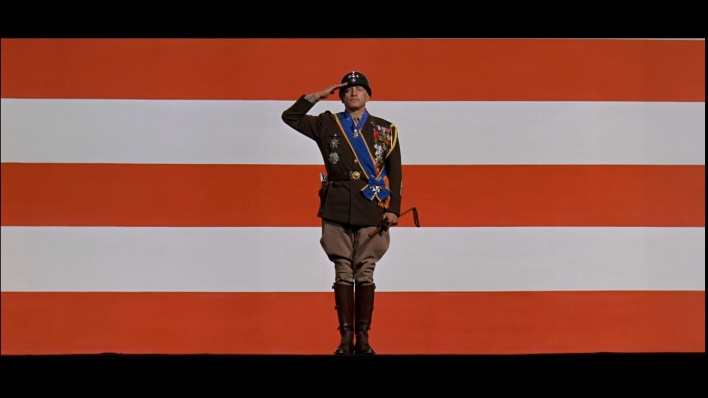
What wins wars?
It’s a question hard to answer
That no army can refuse.
For if every side could answer it,
No side would ever lose.
What wins wars?
Some would say that it’s commitment
Or resolve to reach the goal.
But commitment breeds fanaticism
If it lacks control.
What wins wars?
Some would point to their resources,
Which are squandered easily.
Some would point to perseverance
Or to strength or bravery.
What wins wars?
All of these are necessary,
But they’re not the final trade.
There’s a risk to every battle;
There’s a price that must be paid.
What wins wars?
‘Tis the soldiers wielding courage
And the strength to persevere,
Those committed to their country,
Without whom we’d not be here.
__________________
MPAA rating: GP/PG (more of a PG-13 for language)
My VC has been urging me to review Patton for some time now, and I figured Memorial Day was the perfect time for this World War II biopic. Patton benefits from an Oscar-winning performance from George C. Scott and the Oscar-winning screenplay from none other than Francis Ford Coppola, who interestingly credits this film’s success with his being allowed to direct The Godfather.

While other actors are good, including Karl Malden as General Omar Bradley, this movie lives and dies by the effectiveness of Scott in the title role, and from the first iconic speech he delivers in the film’s opening, speaking to the troops in front of an enormous American flag, he embodies General George S. Patton’s patriotic resolve and uncompromising will. The score is similarly iconic, providing perfect accompaniment to Patton’s military ambitions, and certain scenes are distinctly memorable, like Patton’s slapping of a shell-shocked soldier or his shoot-off with a swooping enemy plane.
All that said, war movies from the ‘70s aren’t what they are today. While I’m grateful for the lack of extreme content, there’s not much action, with the focus instead on Patton as a character. That’s hardly a bad thing, but at nearly three hours, the plot loses steam at times and didn’t need to be that long. I also found it odd that the film stopped short of Patton’s unexpected death in a car accident, not even mentioning it in an ending footnote.

As a fan of history, though, I found Patton a great character study of one of America’s greatest generals, providing insight into his lesser known activities as well, such as his passive role in the D-Day invasion and his many difficulties with censoring himself in interviews. He was a monstrous warmonger to some and a nationalist hero to others, a dichotomy of characterizations that the film embraces in equal measure. Considering its balanced treatment and biographical importance, I can see why it won Best Picture that year, in addition to Best Director, Original Screenplay, Film Editing, Sound, Art Direction, and Actor (which Scott famously refused). It also reminded me that Patton himself was a poet, so I ought to add this film to my list of poems used in movies. It’s a bit too long and slow to watch often, but it definitely ranks among the greatest war biopics.
Best line: (Patton) “Now I want you to remember that no bastard ever won a war by dying for his country. He won it by making the other poor dumb bastard die for his country.”
Rank: List Runner-Up
© 2019 S.G. Liput
632 Followers and Counting
